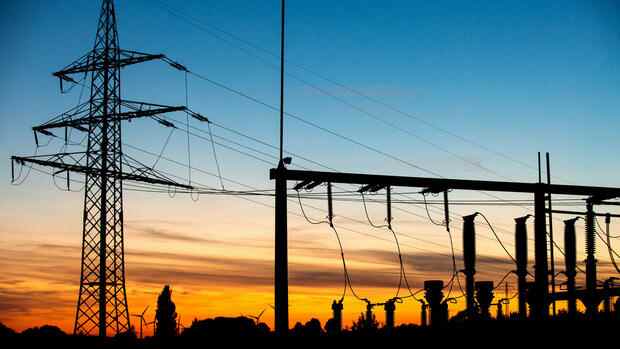Berlin The managing director of the Federal Association of Small and Medium-Sized Businesses (BVMW), Markus Jerger, calls for state help to protect against attacks on the critical infrastructure (Kritis). In the affected sectors, “massive investments must be made in system security and security protection,” Jerger told the Handelsblatt. However, medium-sized companies are no longer financially able to do this. “Therefore, it requires government emergency programs that companies can access.”
Jerger was reacting to Federal Interior Minister Nancy Faeser (SPD), who had asked operators of critical infrastructure facilities to do more for security. You would have to “invest massively” in order to build up structures several times and to have more back-up systems in place if the main systems should fail, the SPD politician told the “Frankfurter Allgemeine Sonntagszeitung”.
The minister also warned in the “Süddeutsche Zeitung” that the operators had to arm themselves against dangers such as natural disasters, terrorism, sabotage, but also human error. The destruction of the Nord Stream pipelines in the Baltic Sea and the attacks on Deutsche Bahn clearly showed “that we have a changed threat situation. We have to prepare for all conceivable scenarios and continue to ramp up protective measures.”
Critical infrastructure includes facilities from the energy, transport, water, food, state and administration, health, information technology and telecommunications sectors.
Top jobs of the day
Find the best jobs now and
be notified by email.
Jerger said that medium-sized companies were appalled that the minister made it clear with her statements that the worst was to be feared. “It is more than a disappointment that our country, a leader in the world, is literally running out of juice,” he said, referring to energy supplies. Of course, government, business and people would have to work together now to prevent an even greater catastrophe. Party-political quarrels are just as unhelpful as sticking to debt limits. “Whoever doesn’t react now loses,” stressed Jerger.
Faeser also emphasizes a turning point in internal security
In Germany, it is fundamentally the task of the companies and authorities that operate critical infrastructure to ensure the safe and reliable operation of their systems and facilities. When it comes to cyber security, for example, they are in contact with the Federal Office for Information Security (BSI). When it comes to espionage risks, they receive warnings from the Office for the Protection of the Constitution.
>> Read also: Greens see massive deficits in the protection of critical infrastructures
Faeser confirmed that she wants to present key points for a new “Kritis umbrella law” this year. It is intended to stipulate how operators can protect themselves better and when they must report an incident. At the same time, Faeser admitted that it would not be possible to “fully protect 34,000 kilometers of railway lines and millions of cable kilometers with cameras, sensors or even police officers”.
At the same time, the minister emphasized that the protection of critical infrastructure had “top priority”. “The Russian war of aggression against Ukraine also marks a turning point in internal security. We are arming ourselves for this.”
Green leader Omid Nouripour also said that sabotage on the pipelines, on Deutsche Bahn or the power outage on the Danish island of Bornholm had shown how acute the problem was.
The discussion arose after explosions in the Baltic Sea destroyed the two natural gas pipelines of Nord Stream 1 and one of the two strands of Nord Stream 2. However, no gas was currently being delivered from Russia to Germany through the pipelines anyway.
In addition, unknown persons had cut an important radio network in two places in North Rhine-Westphalia and Berlin last weekend, so that rail traffic in northern Germany came to a complete standstill for several hours. The chairman of the secret service control committee in the Bundestag, Konstantin von Notz (Greens), criticized that a lot had been missed in recent years. Central security policy risks have not been recognized as such for years. It’s taking revenge now, he said.
City day thinks blackout is a realistic scenario
The Greens in particular have been calling for a “Kritis umbrella law” for some time, which should also regulate IT security issues. Such a law was agreed in the coalition agreement between the SPD, the Greens and the FDP. “Today, the law is more urgent than ever and must be implemented immediately,” the Greens warned in a motion for the federal party conference in Bonn.
>> Read here: Six German companies affected: Cyber attacks on European energy companies are increasing
The CDU politician Roderich Kiesewetter meanwhile called on the population to better arm themselves against power failures. Not everyone is aware of “the seriousness of the situation”. The government must therefore say to the citizens: “Buy radios with batteries, make sure you have water supplies.”
The German Association of Cities also called for the population to be better informed about the possible consequences of energy shortages or sabotage. “A blackout is a realistic scenario,” said managing director Helmut Dedy of the “Süddeutsche Zeitung”. “People have so far been inexperienced with crises and disasters. “That’s why continuous, transparent and low-threshold information about possible risks is important.”
A functioning emergency supply of water and heat is only possible for a maximum of 72 hours, according to Dedy. Municipal civil protection cannot handle blackouts lasting several days alone. Government agencies would then have to work together across all levels.
More: “The threat is growing” – How endangered is the critical infrastructure in Germany

